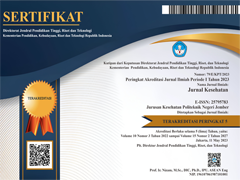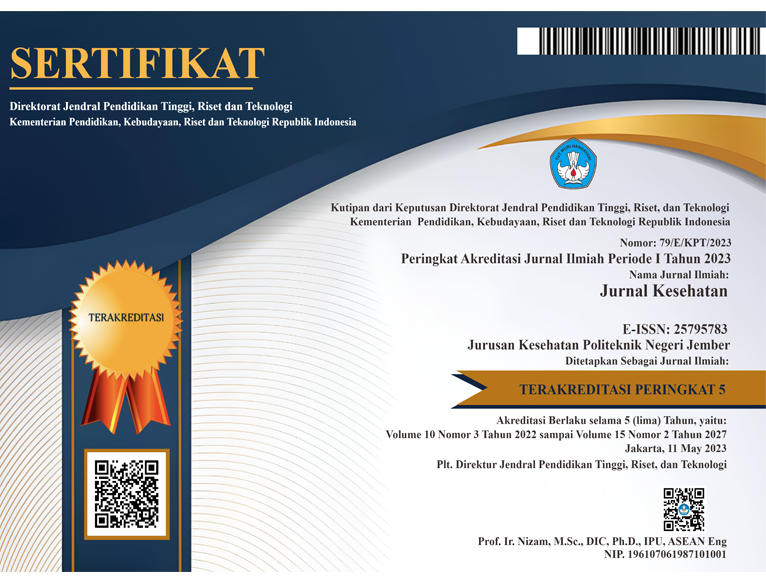Determinan Pemberian ASI Ekslusif di Puskesmas Sakti, Kota Bakti, Aceh
DOI:
10.25047/jkes.v10i2.360Downloads
Abstract
World Health Organization (WHO) recommends that babies only breastfeed with breast milk for at least 6 months. Based on data from the Pidie District Health Office in 2017, exclusive breastfeeding for babies 0-6 months is 25% while the target is 100%, so from the 2017 data it is still far from reaching the target. In 2018 there was an increase in the achievement of exclusive breastfeeding by 59% and in 2019 there was an increase of 63%. Based on the Profile Data of the Sakti Pidie District Health Center from 2017 to 2019, the achievement of exclusive breastfeeding in infants aged 0-6 months in 2017 was 14%, in 2018 the percentage decreased to 11% and in 2019 increased to 43%. This indicates that there are still many babies who are not exclusively breastfed. The purpose of this study was to determine the factors associated with exclusive breastfeeding for infants aged> 6 months - 24 months in the Work Area of Pidie District Health Center Sakti in 2020. This study used a cross-sectional study design. This research conducted at Puskesmas Sakti Kota Bakti Subdistrict, Aceh Province on February until March 2020. This research consists of two variables, dependent (namely knowledge, occupation, early initiation of breastfeeding, husband’s support and support from health workers) and variable independent (exclusive breastfeeding). Based on bivariate analysis, it was found that there was no significant relationship with exclusive breastfeeding, namely knowledge (0.102), occupation (0.431), early initiation of breastfeeding (0.052) and support from health workers (0.491). There is a relationship between husband's support and the provision of exclusive ASI (0.0310) at the Sakti Puskesmas, Sakti District, Pidie Regency in 2020. The results of this study prove that there is no significant relationship between variables (knowledge, occupation, early initiation of breastfeeding and support from health workers) and exclusive breastfeeding at Sakti’s Puskesmas. There are other factors related to exclusive breastfeeding, such as education, family income, maternal health, socio-culture, the influence of social media and mother's beliefs.
License
Copyright (c) 2022 Ramadhaniah Ramadhaniah, Cut Yulinawati, Syariffuddin Syariffuddin

This work is licensed under a Creative Commons Attribution-ShareAlike 4.0 International License.
Authors who publish in this journal agree to the following terms:
1. Copyright belongs to the medical journal as a publication
2. The author retains copyright and grants the journal rights to the first publication carried out simultaneously under a Creative Commons Attribution License which allows others to share the work with an acknowledgment of the author's work and initial publication in this journal.
3. Authors may enter into separate additional contractual arrangements for the non-exclusive distribution of the work (eg sending it to an institutional repository or publishing it in a book) with acknowledgment of initial publication in this journal.
4. Authors are permitted and encouraged to post work online (eg in institutional repositories or on their websites) before and during the submission process, as before and larger citations of published work (see Effects of Open Access).
Selengkapnya tentang teks sumber ini














